
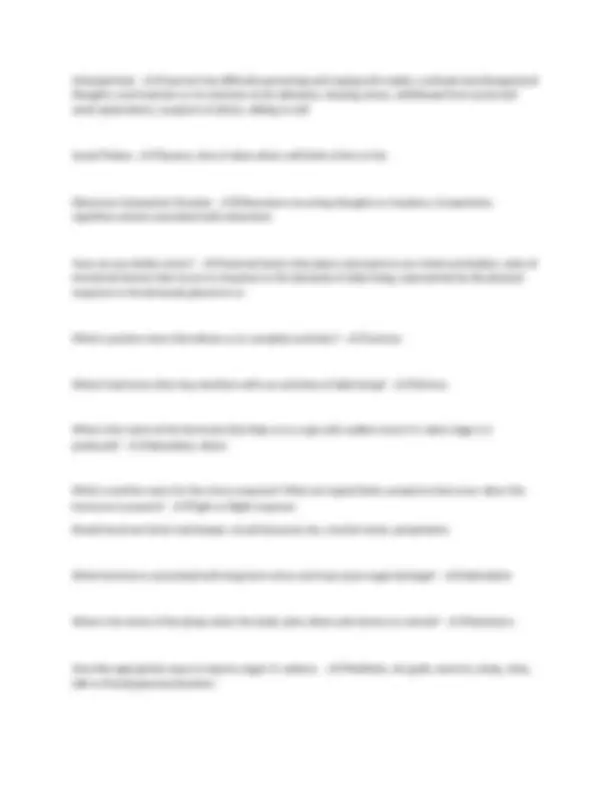
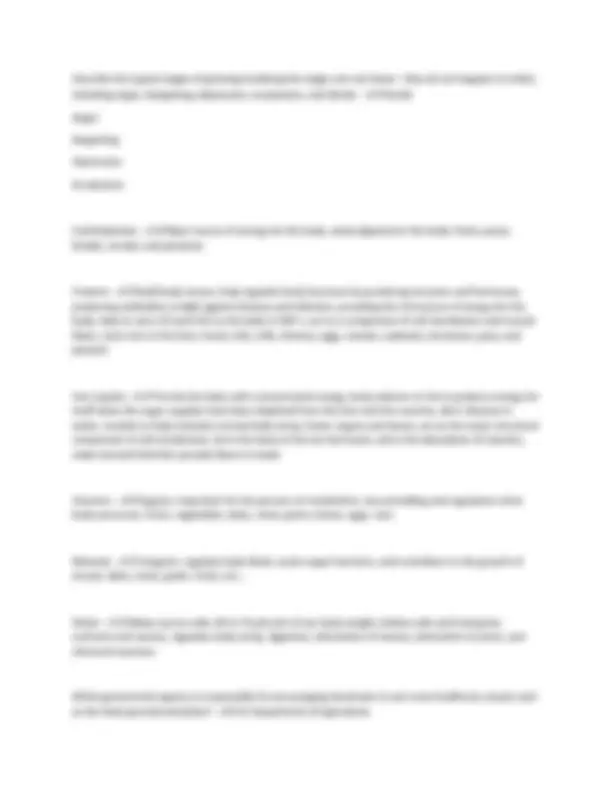
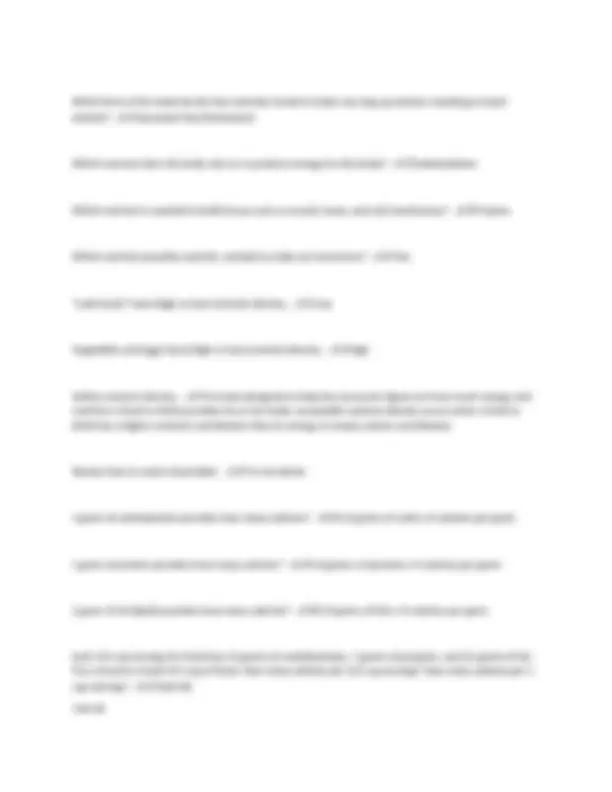
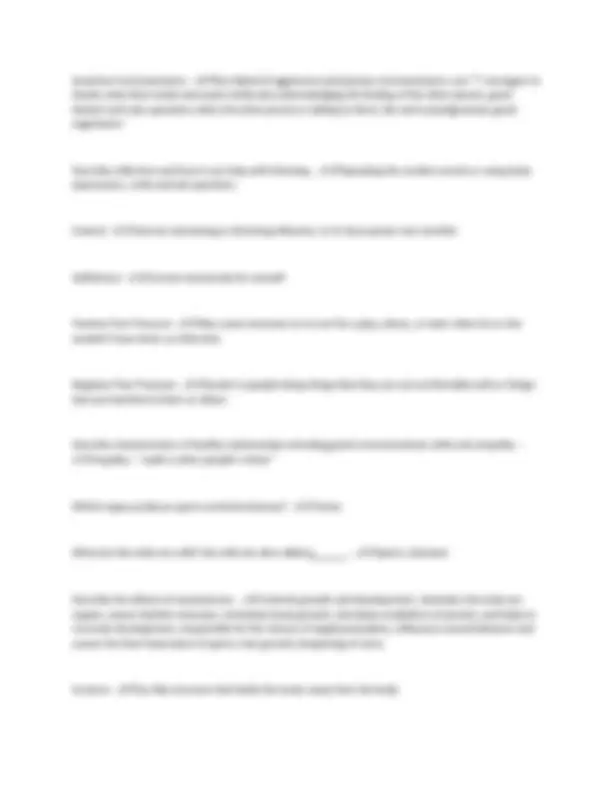
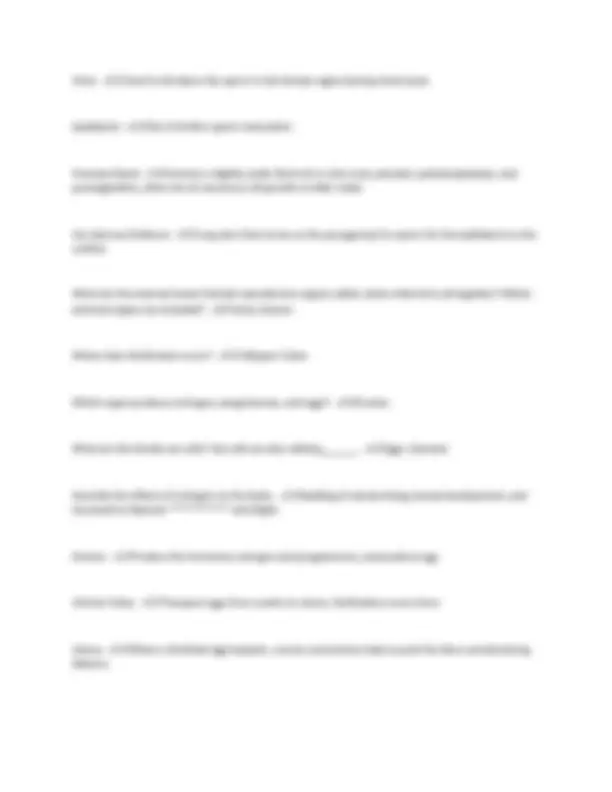
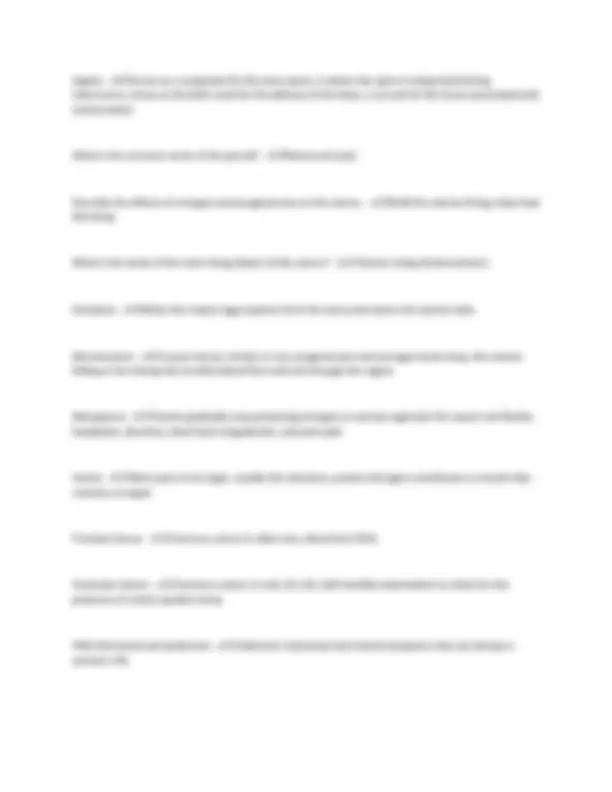
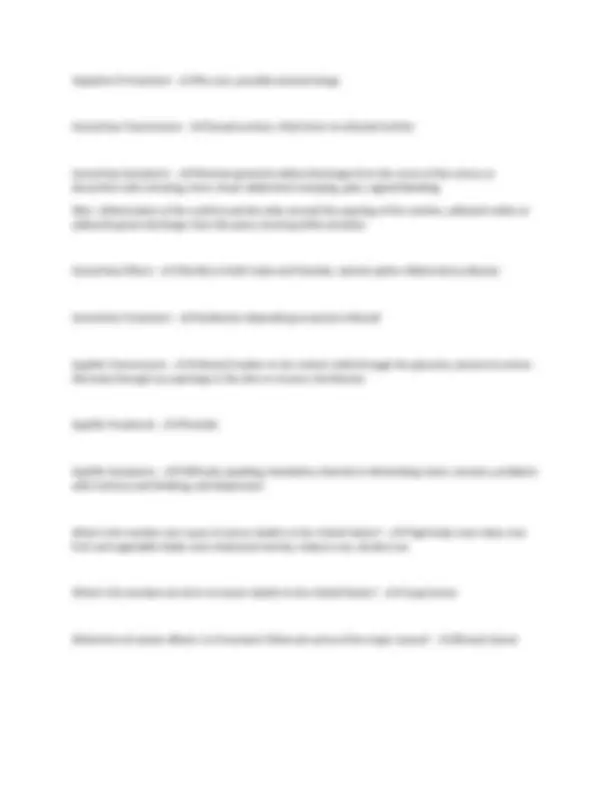
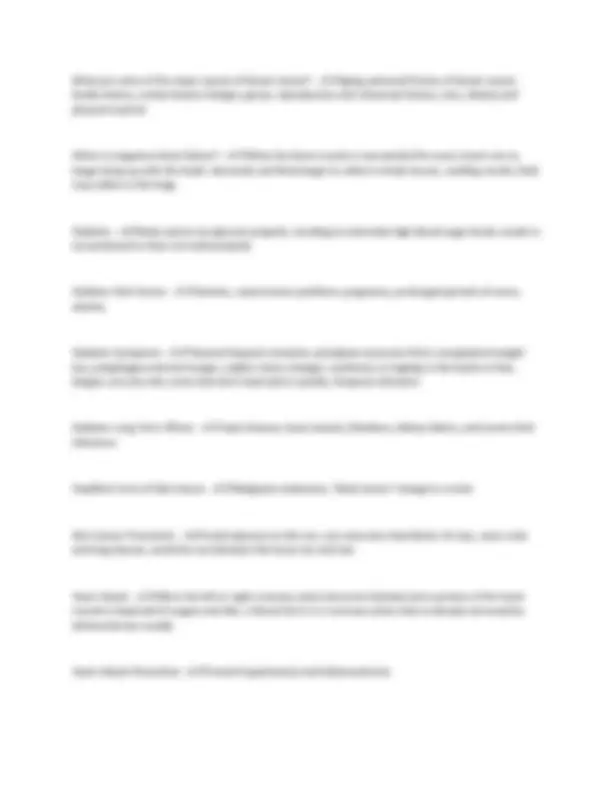
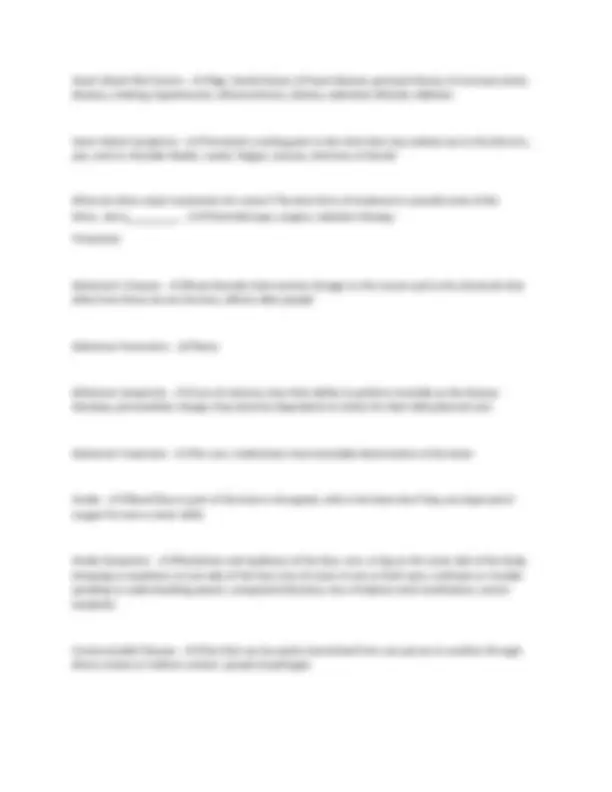


Study with the several resources on Docsity

Earn points by helping other students or get them with a premium plan


Prepare for your exams
Study with the several resources on Docsity

Earn points to download
Earn points by helping other students or get them with a premium plan
Community
Ask the community for help and clear up your study doubts
Discover the best universities in your country according to Docsity users
Free resources
Download our free guides on studying techniques, anxiety management strategies, and thesis advice from Docsity tutors
A series of comprehensive questions and answers related to health, covering topics such as maslow's hierarchy of needs, types of health (physical, social, mental), risk factors, defense mechanisms, mood disorders, stress, nutrition, and fitness. It also addresses aspects of communication and friendship. This material is designed to provide a thorough review of key concepts in health and wellness, suitable for exam preparation or general knowledge enhancement. It offers a structured approach to understanding various health-related topics, making it a valuable resource for students and anyone interested in improving their health literacy. The document's question-and-answer format facilitates active learning and retention of information, promoting a deeper understanding of the subject matter.
Typology: Exams
1 / 16

This page cannot be seen from the preview
Don't miss anything!










List the needs in order from the most basic to the high levels. - ✔✔Basic physical needs, safety needs, social needs, esteem needs, self-actualization What needs must be met first before all others? - ✔✔Basic Physical Needs What need is at the top of the pyramid when a person can function independently and does not constantly seek approval from others? - ✔✔Self-actualization If your physical or emotional safety is threatened, what level is being affected? - ✔✔Safety Needs What type of health is described when we take care of our bodies by eating well, sleeping needed amounts, and exercising? - ✔✔Physical Health What type of health is described by our ability to interact with other people? - ✔✔Social Health What type of health is improved an maintained by learning, feeling good and being able to succeed? - ✔✔Mental Health Define risk factor - ✔✔Any threat to disruption to health making us more susceptible to disease or injury What is the type of risk factor when traits are passed from parents to offspring through the chromosomes? - ✔✔Genetic Chromosomes are made of the genetic material called. - ✔✔DNA What is the type of risk factor that may include our peer groups and our families? - ✔✔Social Environment
All humans try daily to have their needs met. What happens to use when our needs are not met? - ✔✔Frustration and Tension What do we as humans typically use to cope with unmet needs? - ✔✔Defense Mechanisms Denial - ✔✔Not recognizing a particular feeling or problem Projection - ✔✔Putting your faults and problems onto another person; blaming others for your failure Repression - ✔✔Removing an unpleasant idea or memory from your mind Rationalization - ✔✔Giving false reasons or making excuses for your behavior or feelings Compensation - ✔✔Doing well in one area to make up for doing poorly in another area Reaction-formation - ✔✔Not saying how you really feel; saying something contrary Are you able to define a mood disorder (sometimes called mental illness)? Can you describe some of the general warning signs or symptoms? - ✔✔Anxious without obvious reason, anxiety immobilizes you or terrifies you, extreme mood swings, extended depressed mood, restrict intake of calories or purge, recurring unwanted impulses, difficulty differentiating between what is real and imagined, trying to find relief in drugs or alcohol, people noticed a change in your behavior Bipolar (bipolar disorder, in the past called manic depression) - ✔✔Experiences extreme happiness and extreme depression, manic and depressive episodes Depression - ✔✔When sadness and negativity interferes with the normal activities of daily living and persist for long periods of time
Describe the typical stages of grieving (realizing the stages are not linear—they do not happen in order), including anger, bargaining, depression, acceptance, and denial. - ✔✔Denial Anger Bargaining Depression Acceptance Carbohydrates - ✔✔Major source of energy for the body, easily digested in the body; fruits, pasta, breads, cereals, and potatoes Proteins - ✔✔Build body tissues, help regulate body functions by producing enzymes and hormones, producing antibodies to fight against disease and infection, providing the 3rd source of energy for the body, help to carry O2 and CO2 to the body in RBC's, act as a component of cell membranes and muscle fibers, store iron in the liver; meats, fish, milk, cheeses, eggs, cereals, soybeans, dry beans, peas, and peanuts Fats (Lipids) - ✔✔Provide the body with concentrated energy, body relieves on fat to produce energy for itself when the sugar supplies have been depleted from the liver and the muscles, don't dissolve in water, insulate to help maintain normal body temp, fusion organs and bones, act as the major structural component of cell membranes, form the basis of the sex hormones, aid in the absorption of vitamins, make stomach feel full, provide flavor in meals Vitamins - ✔✔Organic; important for the process of metabolism, tissue building and regulation other body processes; fruits, vegetables, dairy, meat, grains, beans, eggs, nuts Minerals - ✔✔Inorganic; regulate body fluids, assist organ functions, and contribute to the growth of tissues; dairy, meat, grains, fruits, etc... Water - ✔✔Makes up our cells, 60 to 70 percent of our body weight, bathes cells and transports nutrients and wastes, regulates body temp, digestion, elimination of wastes, lubrication of joints, and chemical reactions Which government agency is responsible for encouraging Americans to eat more healthy by visuals such as the food pyramid and plate? - ✔✔US Department of Agriculture
Which form of fat made by the liver and also found in foods can clog up arteries resulting in heart attacks? - ✔✔Saturated Fats/Cholesterol Which nutrient does the body rely on to produce energy for the body? - ✔✔Carbohydrates Which nutrient is needed to build tissue such as muscle, bone, and cell membranes? - ✔✔Proteins Which nutrient provides warmth, needed to make sex hormones? - ✔✔Fats "Junk foods" have (high or low) nutrient density. - ✔✔Low Vegetables and eggs have (high or low) nutrient density. - ✔✔High Define nutrient density. - ✔✔Formula designed to help the consumer figure out how much energy and nutrition a food or drink provides his or her body; acceptable nutrient density occurs when a food or drink has a higher nutrient contribution than its energy or empty calorie contribution Review how to read a food label. - ✔✔I'm not dumb 1 gram of carbohydrate provides how many calories? - ✔✔# of grams of carbs x 4 calories per gram 1 gram of protein provides how many calories? - ✔✔# of grams of proteins x 4 calories per gram 1 gram of fat (lipid) provides how many calories? - ✔✔# of grams of fats x 9 calories per gram Each 1/2 cup serving of a food has 15 grams of carbohydrates, 7 grams of proteins, and 12 grams of fat. You consume a total of 1 cup of food. How many calories per 1/2 cup serving? How many calories per 1 cup serving? - ✔✔15x4= 7x4=
When we do a measurement of body fat compared to lean muscle mass, we are checking what? - ✔✔Body Composition Being able to put your joints through various stretching exercises is called? - ✔✔Flexibility Which form of exercise is usually associated with improving the cardiovascular or cardiorespiratory fitness? - ✔✔Aerobic Exercise Which form of exercise can increase muscle strength such as weight lifting? - ✔✔Anaerobic Exercise Which describes a craving for non-food items like cream? Which mineral is usually missing from the diet? - ✔✔Pica, Zinc/Iron deficiency Mindless eating because of stress or distraction can also be called? - ✔✔Binge Eating A mood disorder associated with the abnormal fear of food and getting fat, distortion of body image, and a loss of control is know as what? - ✔✔Anorexia Nervosa Eating large amounts of food followed by some form of purging is known as what? - ✔✔Bulimia Nervosa Characteristics of a good friend - ✔✔I don't have friends Passive Communicators - ✔✔Those who don't like to rock the boat, always avoid conflict and always acknowledge both sides of an issue, don't speak up for themselves Aggressive Communicators - ✔✔Those who put themselves over everyone else, believe they are right in all situations and do not look to see other sides or options
Assertive Communicators - ✔✔Nice blend of aggressive and passive communicators, use "I" messages to clearly state their needs and wants while also acknowledging the feeling of the other person, good listener and asks questions when the other person is talking to them, fair and nonjudgmental, good negotiators Describe reflection and how it can help with listening. - ✔✔Repeating the senders words or using body expressions, smile and ask questions Control - ✔✔Exercise restraining or directing influence, or to have power over another Selfishness - ✔✔Concern exclusively for oneself Positive Peer Pressure - ✔✔May cause someone to try out for a play, dance, or team when he or she wouldn't have done so otherwise Negative Peer Pressure - ✔✔Results in people doing things that they are not comfortable with or things that are harmful to them or others Describe characteristics of healthy relationships including good communications skills and empathy. - ✔✔Empathy-- "walk in other people's shoes" Which organ produces sperm and testosterone? - ✔✔Testes What are the male sex cells? Sex cells are also called g. - ✔✔Sperm, Gametes Describe the effects of testosterone. - ✔✔controls growth and development, maintains the male sex organs, causes hairline recession, stimulates bone growth, stimulates anabolism of protein, and helps in muscular development, responsible for the closure of epiphyseal plates, influences sexual behavior and causes the final maturation of sperm, hair growth, deepening of voice Scrotum - ✔✔Sac-like structure that holds the testes away from the body
Vagina - ✔✔Serves as a receptacle for the erect penis, is where the sperm is deposited during intercourse, serves as the birth canal for the delivery of the fetus, is an exit for the tissue associated with menstruation What is the common name of the period? - ✔✔Menstrual Cycle Describe the effects of estrogen and progesterone on the uterus. - ✔✔Build the uterine lining, help shed the lining What is the name of the inner lining (layer) of the uterus? - ✔✔Uterine Lining (Endometrium) Ovulation - ✔✔When the mature egg ruptures from the ovary and enters the uterine tube Menstruation - ✔✔Corpus luteum shrinks in size, progesterone and estrogen levels drop, the uterine linking is lost during the monthly blood flow and exit through the vagina Menopause - ✔✔Ovaries gradually stop producing estrogen as woman approach 50, causes hot flashes, headaches, dizziness, heart beat irregularities, and joint pain Hernia - ✔✔When part of an organ, usually the intestines, pushes through a membrane or muscle that contains an organ Prostate Cancer - ✔✔Common cancer in older men, blood test (PSA) Testicular Cancer - ✔✔Common cancer in men (15-24), Self monthly examination to check for the presence of a hard, painless lump PMS (Premenstrual Syndrome) - ✔✔Collection of physical and mental symptoms that can disrupt a woman's life
Cervical (uterine) Cancer (what test helps to detect it?) - ✔✔Kills 1/3 of woman diagnosed with it, detected with pap smears Breast cancer (what test helps to detects it? What x-ray help to detect it?) - ✔✔Lump on the breast, detected through self examinations and mammograms Fertilization (Conception) - ✔✔Takes place within the uterine tubes, sperm reaches the egg, it penetrates the tough membrane of the egg by enzymes found within the sperm, the nuclei of the egg and sperm fuse together, producing a cell known as zygote What is the name of the first fertilized cell? Z. - ✔✔Zygote Describe implantation—What is it? Where does it occur? - ✔✔Blastocyst implants in the lining of the uterus, about seven days after fertilization From implantation to about 8 weeks, the developing structure is called an e. - ✔✔Embryo From 8 weeks until birth, the developing baby is called what? - ✔✔Fetus Trimester 1 - ✔✔Embryo 1st 3 months, fetus, placenta forms Trimester 2 - ✔✔4th-6th months, body systems are near functional completion, developing baby grows rapidly tripling its length, weight increases Trimester 3 - ✔✔7th-9th month, all organ systems are functioning, rate of growth decreases, baby experiences largest weight gain Care for a pregnant woman is done by healthcare providers and is called p c. - ✔✔Prenatal Care
Hepatitis B Treatment - ✔✔No cure, possible antiviral drugs Gonorrhea Transmission - ✔✔Sexual contact, infant born to infected mother Gonorrhea Symptoms - ✔✔Women-greenish-yellow discharge from the cervix of the uterus or discomfort wile urinating, fever, lower abdominal cramping, pain, vaginal bleeding Men- inflammation of the urethra and the sides around the opening of the urethra, yellowish-white or yellowish-green discharge from the penis, burning while urination Gonorrhea Effects - ✔✔Sterility in both males and females, women-pelvic inflammatory disease Gonorrhea Treatment - ✔✔Antibiotics depending on person infected Syphilis Transmission - ✔✔Infected mother to her unborn child through the placenta, bacterium enters the body through any openings in the skin or mucous membranes Syphilis Treatment - ✔✔Penicilin Syphilis Symptoms - ✔✔Difficulty speaking, headaches, blurred or diminishing vision, seizures, problems with memory and thinking, and depression What is the number one cause of cancer deaths in the United States? - ✔✔High body mass index, low fruit and vegetable intake, lack of physical activity, tobacco use, alcohol use What is the number one form of cancer deaths in the United States? - ✔✔Lung Cancer What form of cancer affects 1 in 8 women? What are some of the major causes? - ✔✔Breast Cancer
What are some of the major causes of breast cancer? - ✔✔Aging, personal history of breast cancer, family history, certain breast changes, genes, reproductive and menstrual history, race, obesity and physical inactivit What is congestive heart failure? - ✔✔When the heart muscle is overworked for years, heart can no longer keep up with the body's demands and fluids begin to collect in body tissues, swelling results, fluid may collect in the lungs Diabetes - ✔✔Body cannot use glucose properly, resulting in extremely high blood-sugar levels, insulin is not produced or does not work properly Diabetes Risk Factors - ✔✔Genetics, autoimmune problems, pregnancy, prolonged periods of stress, obesity Diabetes Symptoms - ✔✔Polyuria-frequent urination, polydipsia-excessive thirst, unexplained weight loss, polyphagia-extreme hunger, sudden vision changes, numbness or tingling in the hands or feet, fatigue, very dry skin, sores that don't heal well or quickly, frequent infections Diabetes Long Term Effects - ✔✔Heart disease, heart attacks, blindness, kidney failure, and severe limb infections Deadliest Form of Skin Cancer - ✔✔Malignant melanoma, "black tumor" change in a mole Skin Cancer Prevention - ✔✔Avoid exposure to the sun, use sunscreen that blocks UV rays, wear a hat and long sleeves, avoid the sun between the hours ten and two Heart Attack - ✔✔When the left or right coronary artery becomes blocked and a portion of the heart muscle is deprived of oxygen and dies, a blood clot is in a coronary artery that ia already narrowed by atherosclerosis usually Heart Attack Prevention - ✔✔Prevent hypertension and atherosclerosis
What condition is caused when fatty plaque and cholesterol clog up the arteries reducing blood flow to body tissues like the heart? - ✔✔Atherosclerosis What are some general warning signs of cancer? (Think about the acronym CAUTION and what it stands for.) - ✔✔C=change in bladder or bowel habits A=a sore that does not heal U=unusual bleeding or discharge T=thickening or lumps I=indigestion or difficulty swallowing O=obvious change in a wart or mole N=nagging hoarseness or cough Scientific Term for Heart Attack - ✔✔Myocardial infarction Scientific Term for High Blood Pressure - ✔✔Hypertension